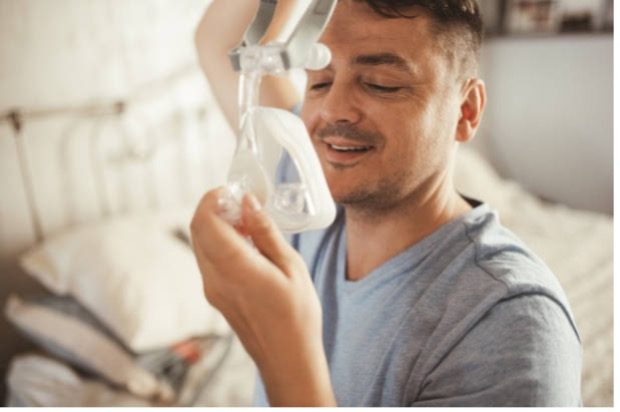It may surprise you to know that about one-third of American adults have obstructive sleep apnea—and most don’t know it.
Obstructive sleep apnea develops when your airway becomes narrowed or blocked during sleep. It causes you to snore, wake frequently, and even gasp for breath—dozens or hundreds of times each night. This leads to chronic fatigue, exhaustion, and other debilitating symptoms—and can be easily diagnosed with a simple at-home sleep study.
According to Dr. Federico Cerrone, a sleep specialist at Atlantic Health, the best way to treat obstructive sleep apnea is with a CPAP machine, which provides continuous positive airway pressure that stabilizes nighttime breathing.
Since both sleep apnea and CPAP therapy are often misunderstood, Dr. Cerrone sets the record straight.
Myth 1: I’m fine, I just don’t sleep well.
Truth: You might not know that you have sleep apnea. Bed partners are usually the first to notice snoring or breathing troubles during sleep.
Myth 2: I don’t want to use a CPAP machine because its uncomfortable.
Truth: Today’s CPAP models are quiet, compact, and customizable. With proper mask fittings, CPAP has a success rate of 75 percent and most people adjust to it within a few weeks.
Myth 3: If I snore, it means I must have sleep apnea.
Truth: Not all snoring is caused by sleep apnea. Structural issues like a small jaw, large tongue, or narrow airway can all contribute to snoring and poor sleep.
Myth 4: A CPAP machine is loud and disruptive.
Truth: The new CPAP machines are very quiet—much quieter than snoring. Bed partners also report better sleep once CPAP is properly fitted and used consistently.
Myth 5: My weight doesn’t affect my sleep.
Truth: Sleep apnea affects people of any weight, but if you’re overweight, losing 10 to 15 percent of your body weight can reduce or even eliminate your symptoms.
Myth 6: There’s nothing I can do to sleep better at night.
Truth: Weight loss, regular exercise, avoiding smoking, alcohol, and sleeping pills, learning to sleep on your side, and using an oral appliance or nasal sprays can all improve sleep.
Myth 7: Sleep apnea is just a snoring problem, it isn’t serious.
Truth: Untreated sleep apnea leads to more than fatigue and brain fog. It also increases your risk of stroke, heart arrhythmias, high blood pressure, memory loss, and even dementia.
Myth 8: I can stop CPAP once my symptoms improve.
Truth: If your symptoms improve on CPAP, it means the therapy is working—not that you’re cured. Stopping CPAP will cause your symptoms to return, along with the related health risks.
Myth 9: CPAP is only for people with severe sleep apnea.
Truth: CPAP works for mild, moderate, and severe sleep apnea. It’s the gold standard treatment for any adult who is exhausted and has been diagnosed with any level of sleep apnea.
Myth 10: Surgery is a better way to fix sleep apnea.
Truth: Removing tonsils or repairing a deviated septum might help but success rates vary. Surgery isn’t a guaranteed fix and often has lower success rates than CPAP.
“Sleep apnea is common and treatable,” says Dr. Cerrone. “When people are tired of feeling tired, they come see me. For many people, CPAP therapy is life-changing — and lifesaving.”










